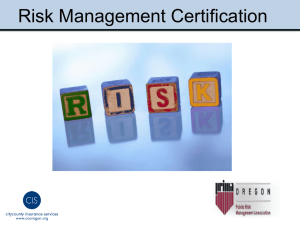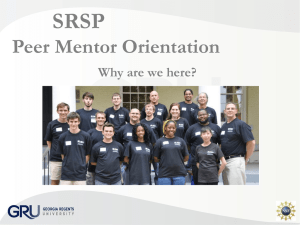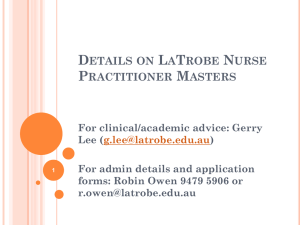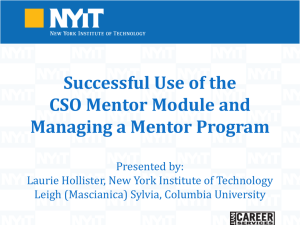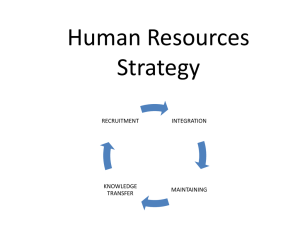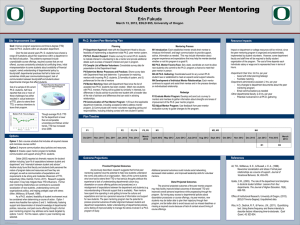PEER MENTORS
advertisement
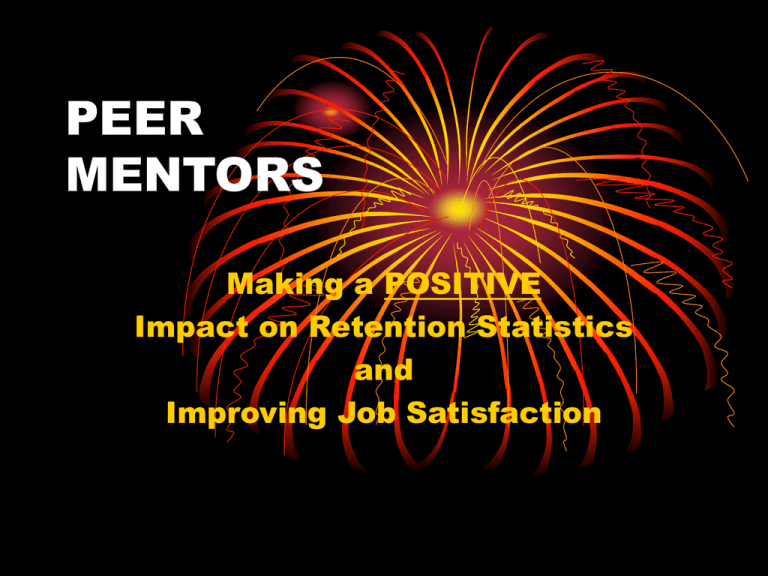
PEER MENTORS Making a POSITIVE Impact on Retention Statistics and Improving Job Satisfaction Presenters: • Penny Abulencia Loretto VP Community Services Executive Director PACE CNY • Cheryl Holava Director of Loretto Community Based Education & Peer Mentor Co-ordinator Presenters: • Shelley McCann Peer Mentor Supervisor • Kim Lanno Peer Mentor • Deidre Johnson Peer Mentor Need Observed: Idea practice The Future of HealthCare • pool of skilled direct care workers • Need to keep the workforce we have. • Provide on-going learning opportunities for growth – personally and professionally The Mentor Program • PACE CNY recognized the value in the concept of mentoring as a support for our Direct Care Workers and actively pursued development of that plan 2005-2007. An idea whose time has come! Victor Hugo Opportunity Knocks! • 2006, Project Home Community Workforce Development Grant. • The Union Training Fund • Connection with a consultant from PHI to prepare us • Mentor Training Program. Retaining the New Employee At the end of 2007, we studied the year’s total “departures from employment” for specific reasons: Largest # of Voluntary and Involuntary terminations were in the first 3 months of employment We brainstormed to create a variety of approaches to address the issues that we can have some influence over. Program Designed after collection of information from: • Staff focus groups • Purpose: develop program goals and created criteria for choosing Mentor candidates. • Staff “buy-in” is critical. Design • Issues that we could impact: improving communication skills early intervention to relieve the predictable stressors Design • The Mentor Supervisor’s role became a dedicated position Lay the foundation • Do not underestimate the importance of the preliminary ground work. It will determine the success of the program Major Organizational Attitude Change • Not just about training a few exceptional Aides • Need for considerable thought and preparation Leadership Support • Be a champion • Explain the plan and everyone’s role in it, clearly to all staff. • Acknowledge the value Training Peer Mentors involves helping them to: • Develop good interpersonal communication skills • Become more self-aware • Build a Leadership role model potential around a positive attitude including pride in their work Program Goals • Assist new aides in developing problem solving strategies, guide them-don’t solve for them • Understand differences in the way people learn • Accept the need to be nonjudgmental of differences Your first week at a new job? • No matter the level of employment – there are feelings Please think about your own feelings the first week you were at your current job. Common Stressors met in the 1st 3 months • We collected input from the workforce. Common issues and feelings were reported: FEAR inadequate skills being in unfamiliar territory Feeling or looking “stupid” exclusion by co-workers or Participants “new kid” syndrome How fast can they get out the door? • Frustrated • Lost • Lack of confidence Overwhelmed Stressors • Desperate to succeed • Unfamiliar with traveling required in Community Care • Don’t know where to go to solve problems encountered Afraid to complain or suggest Support • Next question, “So what can a mentor do about these issues?” Mentor training •Join us at our Break-out Session to see HOW? Important Learning •“ This could benefit my entire life ! ” Benefits • positive career move • recognition of their worth • increased job satisfaction Benefits New skills influenced other seasoned aides • • • • positive inter –actions constructive problem solving role modeling of respect for others future opportunity to become a Peer Mentor. Retention and Statistics Improvements begin! new aides retained through their 1st 6 months of employment • • • • • • 2005 Estimated = 2006 = Peer Mentoring Practiced 2007 = 2008 = 2009 = (Jan.-June) (July-Dec.) • Last 6 mos. (10/09-03/10) = 52% 72% ??? 76% 81.75% 61% ??? 80% 93% Another initiative • Addressing Long-term Valuable Employees needing to revitalize • Career Ladder HHA GCW Mentor GCW II Geriatric Care Workers II Career Ladder Development • Graduate from 13 day Certificate Class CHHA • Complete 36 hrs. of Enhanced Trng on Geriatric Issues GCW • Complete 30 hrs training to become a Peer Mentor • 8 GCWs Applied for & Completed 30 hrs. of concentrated Trng. on Dementia Care, Behavioral Mngmt. & EoL Care – be prepared to support Home Care Nurses and Aides with challenging cases GCW II includes salary increase • Both attend Booster Sessions every other month Mentor Training Details & Retention Techniques See you in Break-out Session!



